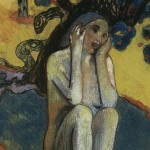The decision to edit and publish the material, covering the years 1962-2003, was defended by Cardinal Dziwisz, who said he had rejected the Pope’s request to destroy it because it provided “a key to understanding his spirituality” and what was “most internal within a person – his relationship with God, to others and to himself”.
But the move has been widely criticised in Poland as an act of disloyalty towards the late Pope, who died in April 2005.
Anna Romejko, a theologian at the Catholic University of Lublin, said she was disappointed by Cardinal Dziwisz’s apparent disregard for the wishes of the Pope, who is to be proclaimed a saint in Rome on 27 April.
She added that John Paul II’s way of experiencing the faith were already amply covered by the “huge spiritual inheritance” in his other writings.
Tom Henagan of Reuters also gave a small glimpse into the contents of the diaries in a piece he published when the Polish edition of the diaries came out:
Now available only in Polish [until the English edition, In God’s Hands: The Spiritual Diaries of Pope John Paul II, comes out this March 28th] the 638-page book is dominated by deep theological reflections that reveal little of what the pope was otherwise thinking or doing when he wrote them.
The picture that emerges deepens but does not jar with his public image, in contrast to the posthumous diaries of Mother Teresa – who died in 1997 and was beatified by John Paul in 2003 – that revealed her long periods of doubt about God’s existence.
Despite the questioning of his own role, there is no sign in the diaries from 1962 to 2003 that the pope’s belief in God wavered.
The first signs of his questioning appear in comments from 1970 where he wrote: “Can the misfortunes of people close to me, which have happened recently, be seen as a punishment? As a sign? What can it mean?”
He paid close attention to the skills required of a priest. “What language do I use when I speak to people?” he asked in 1974. “Do I proclaim the Gospel with complete conviction?”
In his final years, debilitated by illness, the pope’s entries become sparser and the handwriting less assured.
The last entry in 2003 referred to the Biblical story of Jonah, who was ordered by God to preach his word but instead runs away.
The pope, who before his final illness travelled tirelessly around the globe preaching the Gospel, wrote in a sloping script in Italian across the bottom of the page: “Jonah, this is the fear of proclaiming the love of God.”
I suppose there is nothing to do but read this remarkable testament betrayed since it’s out. Would the world have been better without Kafka’s The Trial and The Castle? I’m not so sure. We have Max Brod to thank for that. Thanks to Cardinal Dziwisz we have In God’s Hands just in time for mid-Lent. If you’re looking for other books to compliment it, then take a look at this list of mine from a couple of years back.
I’ll close with something more lighthearted:
For a summary of John Paul II’s early writings on communism see: Prominent Polish Prelates and the Poisonous Fruit of Unbridled Capitalism
Please consider making a donation to this blog through the donation button on the upper right side of its homepage so that we can replace the bald tires on our car. You might miss me if I’m gone!
Stay in touch! Like Cosmos the in Lost on Facebook:
















